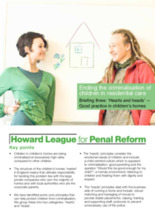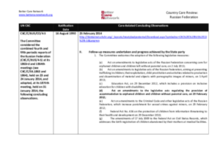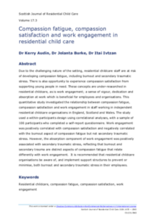Displaying 651 - 660 of 1510
This chapter from Residential Child and Youth Care in a Developing World: Global Perspectives focuses on the institutional care of children and young people deemed ‘at risk’ according to current Malaysian law on child welfare: Malaysian Child Act (2001).
This briefing paper is part of a series from the Howard League that explores some core principles to help protect children in residential care in the UK from criminalisation.
This animated video from Forget Me Not and The Umbrella Foundation, tells the story of a young child placed in an orphanage and highlights the pain and trauma of family separation, the impacts of a revolving door of volunteers on children in institutions, and the ways in which volunteering fuels the orphanage industry.
The objective of the study was to assess the knowledge and practices regarding menstrual hygiene among adolescent girls residing in selected orphanages of Haryana.
This study examines the forms of abuse and neglect experienced by children living in orphanages in East Java Province, efforts by children in orphanages to deal with the acts of abuse experienced, and the role of the orphanage or the Child Social Welfare Institution (LKSA) in providing protection and fulfillment of the rights of abandoned children.
This country care review includes the care related Concluding Observations adopted by the Committee on the Rights of the Child and the Committee on the Rights of Persons with Disabilities.
This paper will report on a study comparing case files for girls victimized (n = 73) and not victimized (n = 62) by commercial sexual exploitation who were living in a residential care setting in a large southwestern city in the United States.
This quantitative study investigated the relationship between compassion fatigue, compassion satisfaction and work engagement in staff working in independent residential childcare organisations in England, Scotland and Wales.
The current study from the Infant Mental Health Journal addressed whether two institution‐wide interventions in St. Petersburg, Russian Federation, that increased caregiver sensitivity (Training Only: TO) or both caregiver sensitivity and consistency (Training plus Structural Changes: T+SC) promoted better socioemotional and cognitive development than did a No Intervention (NoI) institution during the first year of life for children who were placed soon after birth.
The purpose of this study was to establish the prevalence of symptoms of anxiety disorder, depression and post-traumatic stress disorder (PTSD) among adolescents with a history of abuse and neglect living in charitable children’s institutions (CCIs) in Nairobi County, Kenya.




